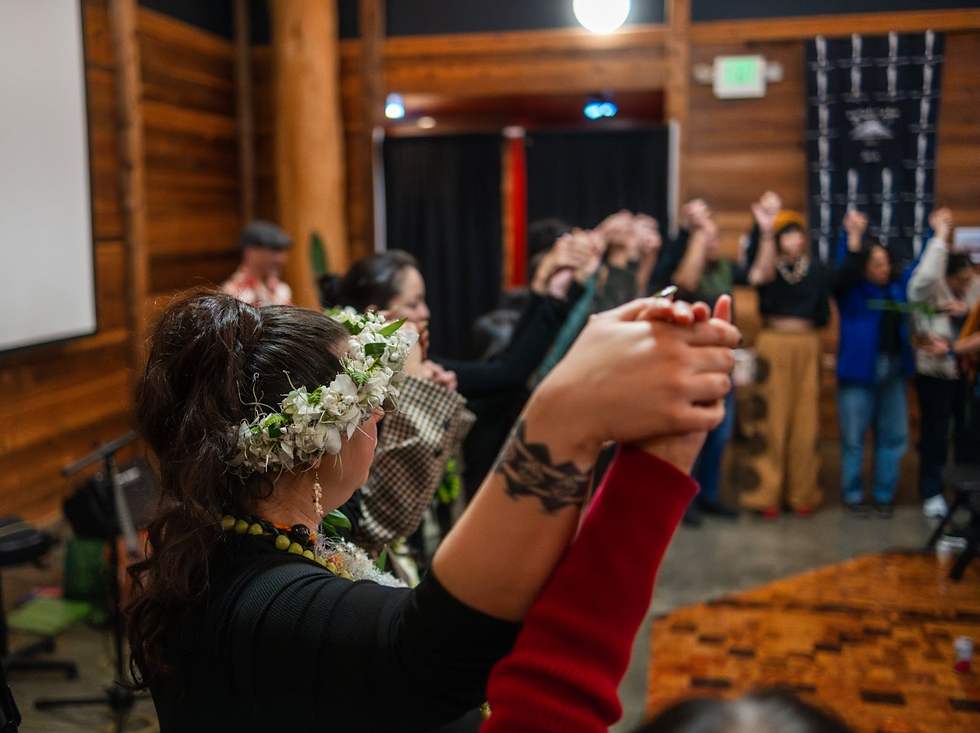Dear Aloha: Exploring the Hawaiian Diaspora through Film
- Olivia Lee

- Sep 6, 2025
- 4 min read
By Olivia Lee

What do you think of when you hear “Hawaii?” Do you envision inviting beaches with golden sand and crystal blue water? Can you smell the slightly chemical scent of coconut sunscreen misting through the humid air? Do you taste the crunch of mango flavored shave ice underneath ridiculous amounts of haupia cream? All of these details conjure an image of paradise, but paradise is dying and we are the ones who are killing it.
Beneath Hawaii’s postcard-perfect image lies a deeper story of displacement and identity, a story “Dear Aloha” – the newest project from filmmaker Cris Romento – brings to light.
“Dear Aloha” is a short film that tenderly documents diasporic Hawaiians living in the Pacific Northwest, authentically exploring themes of identity and generational trauma. Romento drew inspiration from her own life to create the film, citing her move from Hawaii to Washington at the age of 7 as a pivotal moment that shaped her understanding of identity and cultural loss.
“The film for me was a way to continue a healing journey and learn about what the Hawaiian diaspora was,” she says. “I really didn’t know what the word was until 2020.”
Diaspora, the dispersion of a people from their native land, is an issue that has long plagued Hawaii, a consequence from its complicated and painful history with the U.S. According to the U.S. Census, 53% of native Hawaiians no longer live in their homeland (as of 2020). The diaspora is driven by factors like the high cost of living, employment opportunities, and a lack of affordable housing. According to USA Today, Hawaii is the most expensive state to live in (as of 2024), which results in many Hawaiians relocating to the Pacific Northwest and California. According to the King County Department of Public Health, Washington State is home to the third-largest population of Native Hawaiians and Pacific Islanders in the country.
Making the film felt like a homecoming for Romento. After years of being away from home and working as a freelancer on multiple film projects, she found herself learning things the Hawaiian way.
This meant making sure the production crew’s favorite drinks are on set, putting music on, and creating an environment where people felt welcomed.
“I wanted people to feel compelled to be a part of the film for another reason besides the paycheck…That was the most challenging, but also the most rewarding,” she said.
Romento hopes the inclusivity behind the set is what makes the film relatable to audiences.

Films about Hawaii are rarely created through an authentic Hawaiian lens, it reduces the islands to a picturesque backdrop rather than exploring the realities of Hawaiian life. That’s why it was so refreshing to see a Hawaiian story through the lens of an actual Hawaiian. The stories shared on-screen revealed a shared struggle that resonates across the diaspora, a struggle that felt all too familiar.
My own family relocated from Hawaii to Washington, carrying with them the same feelings of disconnection and longing that are expressed in the film. Hearing the stories in “Dear Aloha” gave me strength, reminding me that no matter how alone we feel, there are others that share our pain and understand our story.
Since its release in 2024, Dear Aloha has enjoyed critical success, winning Best Short Documentary at the 2025 FIFO Tahiti Film Festival and airing on PBS’ Homegrown: Documentary Shorts series. While Romento has plans for “Dear Aloha” to be screened at more film festivals, she wants to prioritize community screenings as a way to keep the film rooted in the people it represents.

“I went forth with the mantra: if not me, then who, and if not now, then when?” she said. That sense of urgency is felt throughout “Dear Aloha.” Romento advocates for true Hawaiian representation, reminding us that when Native voices are at the center, the narrative finally begins to shift, revealing truths that have been buried underneath years of neglect and romanticization by the film industry.
The diaspora isn’t just an economic issue, but a cultural one. The connection Hawaiians have to their land is sacred and is central to their identity. By relocating off the island, they aren’t just leaving their home behind – but a part of themselves, risking a gradual loss of language, tradition, and cultural memory.

“I don’t think my kuleana (Hawaiian for responsibility) is to be a filmmaker,” Romento states. “I think my kuleana is to heal my generational trauma. And that’s what this film helped me do. I’m going to continue with that and make more Hawaiian films and make more films about contemporary Hawaii and our lived experiences.”
Hawaii is not a fantasy dreamland that exists for tourists. It’s a real place, with real people facing real loss. But if things don’t change soon, all that will remain are postcards of a paradise that no longer exists.











For those who appreciate leather fashion, the Leather Jacket 8 Ball offers a unique blend of durability and cultural legacy. This jacket is more than apparel—it’s a piece of history. Loved by streetwear fans worldwide, it continues to inspire today’s looks. Browse authentic designs now at Stussy Jacket.